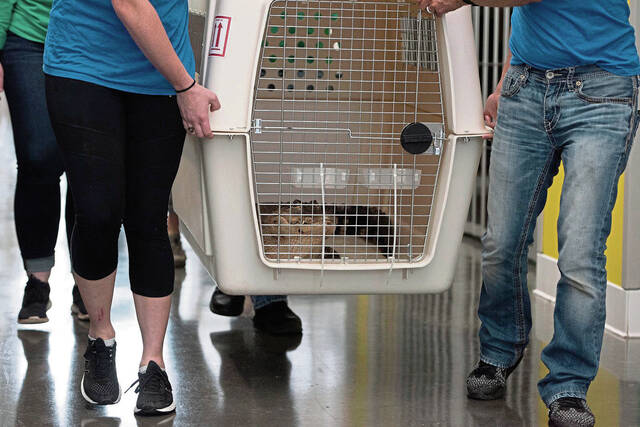About 100 workers at the Humane Animal Rescue of Pittsburgh are seeking to unionize with the United Steelworkers union.
It’s the latest in a series of efforts to organize workplaces in the region and nationally at a time when more workers are going on strike — or have been on the verge of it.
Veterinary technicians and assistants, medical receptionists, animal caretakers and behaviorists, grant writers, educators, wildlife rehabilitators and other staff at HARP filed for a union election on July 24. They are seeking a formal vote through the National Labor Relations Board.
The group says they are organizing for fair pay, job security, transparent communication and increased emotional and mental health support for workers.
“HARP’s leadership frequently and loudly expresses to its employees how important our work is, yet this apparent appreciation is not adequately reflected in our pay or benefits,” said Sharif Khan, a wildlife rehabilitator at HARP.
“We seek a union not only to strengthen our position when advocating for ourselves or the hundreds of animals in our care but to give us a firm voice with which to help steer the organization towards success,” Khan said in a statement.
The workers want to create a collective bargaining unit comprising HARP’s North Side and East Side shelters and Wildlife Rehabilitation Center in Verona.
There has been a wave of unionization efforts across the country. The Tribune-Review reported that new petitions filed by workers to form or join a union jumped 58% nationwide from October 2021 to June 2022 compared with the same months in 2020-21, according to the National Labor Relations Board.
About 21 workers at the Larimer-based nonprofit Hello Neighbor sought voluntary union recognition in January with the USW. Many of those ballots were challenged during the count.
“We are waiting to hear from the NLRB,” said Cheyenne Schoen Gallivan, a spokesperson for the USW.
The United Steelworkers also filed paperwork in June calling for a state-supervised labor election that could unionize more than 5,000 workers at the University of Pittsburgh’s main campus and four branches. The USW already represents about 3,000 full- and part-time faculty on Pitt’s main campus in Oakland and branches in Bradford, Greensburg, Johnstown and Titusville. Formed in 2021, that union is negotiating with Pitt on its first contract.
This month, leaders of Hollywood’s actors union, the Screen Actors Guild-American Federation of Radio and Television Artists, voted to join screenwriters in the first joint strike in more than six decades, shutting down production across the entertainment industry after talks for a new contract with studios and streaming services broke down.
Nationally, Starbucks coffee chain employees have been organizing to join Starbucks Workers United, which is affiliated with the Service Employees International Union. That includes locations in Bloomfield, the South Side, East Liberty, Oakland and North Hills. Those efforts have been contentious with the company. Last week, Starbucks workers from across the country joined local baristas at the company’s Bloomfield and Eastside locations in a strike against stalled contract negotiations and alleged union-busting tactics.
Locally, Pittsburgh Post-Gazette workers have been on strike since October. The unions that represent Post-Gazette employees on strike include the Communications Workers of America Locals 14842 and 14827, Teamsters Local 205/211 and Pressmen’s Union Local 24M/9N and The Newspaper Guild-CWA Local 38061.
On Tuesday, UPS announced that it had reached a contract agreement with its 340,000-person strong union, averting a strike that had the potential to disrupt logistics nationwide for businesses and households alike.
“We’re organizing a union because the people doing the frontline work to care for the animals aren’t given the resources needed to do those difficult jobs to the best of their abilities,” said HARP Development Specialist Frank Groth. “We work in many different roles across the organization, but what we all need is a voice in the decisions that affect us every day.”
A message to the Humane Animal Rescue was not immediately returned.
The USW represents 850,000 workers employed in metals, mining, pulp and paper, rubber, chemicals, glass, auto supply and the energy-producing industries, along with workers in health care, public sector, higher education, tech and service occupations.








